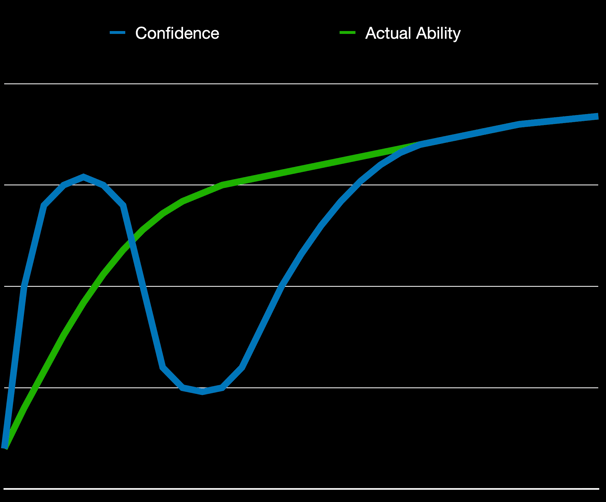Dunning Kruger Effect: Confidence vs Ability
The Dunning Kruger Effect explained and how it can help you
OUR WORLD


Background
Have you ever read a post on social media only to discover that the person is completely clueless about the subject, yet confidently believe they are experts?
Have you ever taken up a hobby, decided that you have a natural ability at it, and then realised that you're not as good as you thought you were?
This phenomenon is known as the Dunning-Kruger effect.
The Dunning-Kruger effect refers to a cognitive bias in which individuals with low ability or knowledge in a particular area overestimate their competence. In other words, people who are incompetent in a specific domain are often unaware of their incompetence and mistakenly believe they possess above-average skills.
This concept was first introduced by psychologists David Dunning and Justin Kruger in 1999, after conducting a series of experiments to explore why some individuals consistently overestimate their abilities.
Interestingly, those who were highly skilled in these tasks tended to underestimate their performance, assuming that others possessed similar levels of competence. This phenomenon is known as the "imposter syndrome."
How it happens
One key psychological factor is the lack of metacognitive skills, which involve the ability to accurately assess one's own knowledge and skills. Incompetent individuals often lack the necessary skills to evaluate their own performance objectively, leading to inflated self-assessments.
Additionally, social and cultural factors can also influence the Dunning-Kruger effect. In a society that values confidence and self-assurance, individuals may feel pressure to project an image of competence.
Studies conducted in different countries revealed the following statistics:
In the USA, 93% of drivers rated their driving ability as "above average".
In Sweden, 69% of drivers rated their driving ability as "above average".
In Japan, less than 35% of drivers rated themselves as "above average".
The graph illustrates the relationship between confidence and actual ability.
Initially, confidence can be very high, but as the individual continues to acquire experience, they realise that they have far less ability than previously thought. At this point the confidence comes crashing down. This feeling is sometimes referred to as "imposter syndrome".
Only then, will their confidence start to increase again, this time more gradually, but more in alignment with their actual competence.
As the greek philosopher Socrates said,
"Admitting one's ignorance is the first step in acquiring knowledge".
or as Confucius once said,
"To know what you know and what you do not know, that is true knowledge".
Conclusion
The disparity between confidence and competence is the essence of the Dunning-Kruger effect.
While it can be very difficult to convince another individual of their position on the graph above, we can still benefit by recognising the pattern in ourselves. This will help us navigate our way better through many aspects of life, from social media interactions to driving our cars.
It may even save you a trip to the hospital.


